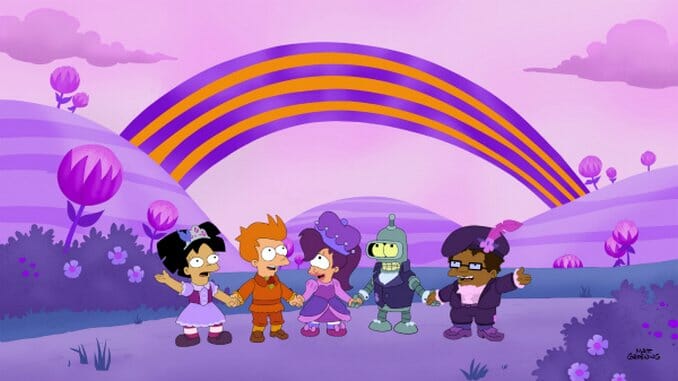
At this point, the “gimmick” episodes of Futurama have become as much a part of the show’s identity as anything else it does. Even so, last night’s episode was a surprise given that for the most part, these have been relegated to finales and specials rather than within the show’s normal run. From the beginning they’ve been a way for Futurama to do something akin to The Simpsons’ Halloween episodes but without the constraints of the holiday theme. Sometimes they’ve had a framing story, sometimes they haven’t, but in every case they’ve been bold, often to the point of strangeness more than humor. If Futurama has always been about going anywhere and doing anything, then these are about taking things a little bit further and throwing out the few ground rules that even a wild science-fiction series sets in place.
The only real disappointment I had with “Saturday Morning Fun Pit” was that the show has done a parody of other animation styles before. “Reincarnation” was brilliant, one of the best episodes Futurama has done, not just in its most recent run but ever, and offered up parodies of old Fleischer-style animation, video game animation and anime. As should be obvious given its name, “Fun Pit” was all about the old Saturday-morning cartoons that its writers grew up with, specifically Scooby Doo, Strawberry Shortcake and G.I. Joe. It’s not quite the same premise, but the shock value was missing this time, as was a little bit of the novelty.
That being said, all three parodies were excellent, not to mention the bumpers and television commercials edited between them, even if the framing device that Nixon wants to watch cartoons was kind of lame. Like last time, Futurama tended away from jokes particular to Futurama and leaned very hard on animation gags. Its Scooby Doo parody was filled with animation loops and reused backgrounds, not to mention jump cuts, “pulled” frames and every other low-budget Hannah Barbara trick crammed into something like eight minutes. The presence of the Harlem Globetrotters was a particular stroke of brilliance. Still, some of the animation gags were forced, and at times they lingered too long on their own cleverness. The best jokes just happened rather than having Fry or Leela point out the shoddiness of the plotting or movement. There were a few times when I laughed, then a character pointed out a joke I’d already laughed at and I sighed a bit. Like latter-day Family Guy, Futurama, it seems, doesn’t completely have faith in its own audience to understand its humor.
While I’m far less familiar with Strawberry Shortcake, the gag in the second short was less about the show and more about the marketing within Saturday morning cartoons. The constant commercials threatened to turn the segment into a one-gag bit, but so many other parts were clever, from the color-based idiocy to Zoidberg’s insistent “Borks,” that it never happened. What also worked so well was that it wasn’t, strictly speaking, a style parody. That was there, but hinging the segment on something else was really what helped the entire “Fun Pit” rise above another series of parodies, turning it into an homage to a format rather than just a few particular cartoons. Plus, the constant cutting between bumpers, commercials and segments led to some very tight pacing.
Speaking of pacing, by the end of “Fun Pit” the jokes were coming incredibly fast, as “G.I. Zap” took the violence of that particular cartoon genre and spoke about the weird censorship on shows allegedly for children. This segment clearly caused the format for the whole episode, as they needed a reason to have someone commenting over “G.I.Zap.” I thought the premise was kind of lame, but the fourth wall-breaking commentary while the cartoon happened was something I don’t believe I’ve ever seen before, and it was pretty wonderful to behold.
What saved “Fun Pit” for me really ended up being the focus on this odd format. I would’ve enjoyed more animation parodies regardless of that, given that Matt Groening in particular is a complete animation nerd and the show’s writing staff would’ve found new jokes within this realm regardless. But by taking on the format as a whole, it forced Futurama into much more fruitful territory. It was really the intertextual humor, its strangeness and offhandedly avant-garde nature, that made “Fun Pit” excellent, dispelling my initial trepidation until I was delighted by what surprises the show’s creators had in store. Perhaps it wasn’t an entirely new place for Futurama to explore, but its execution more than made up for it.